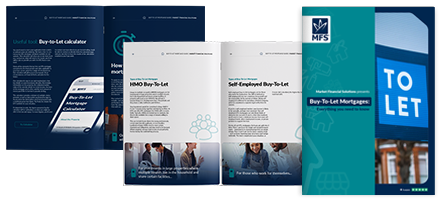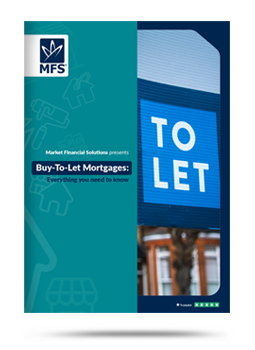Market Financial Solutions are a bridging loan and buy-to-let mortgage provider and are not legal, financial, investment or tax advisers. This document is for informational purposes only and does not, and should not be considered, to constitute legal, financial, investment or tax advice or be relied upon by any person to make a legal, financial, investment or tax decision. Therefore, Investors are encouraged to seek appropriate professional advice. The information in this content is correct at time of writing.

As interest rates rise, assets across the financial landscape, including real estate, are affected. The property sector is particularly synchronized with changing rates. Many mortgage products are designed to track the Bank of England’s (BoE) decisions.
Also, many pundits believe that having near-zero rates for years contributed to the skyrocketing property prices we’ve seen in recent times. In prior decades, the base rate sat much higher than what modern investors are used to.
For much of the 1980s, for example, interest rates hovered above or close to 10%[1]. Throughout the 90s, they fluctuated between 5% and 7%. Yet, in the 21st Century, the base rate suddenly fell.
In 2007, the official BoE base rate was around 5%. Then came the global financial crisis. By March 2009, it had been slashed to 0.5%, where it stayed until August 2016.
The EU referendum in June 2016, and the pro-Brexit outcome, prompted the BoE to cut rates further to 0.25%. While they were starting to creep up again throughout 2018 and 2019, the emergence of Covid-19 brought interest rates crashing down to a historic low of 0.1% in March 2020.
However, as the UK emerged from the pandemic and relative normality returned, the BoE slowly started to push the base rate upwards again. The question of how quickly rates should be raised came to the forefront as a new cost of living crisis emerged[2]. Mainly driven by the fallout of the invasion of Ukraine, energy bills jumped which in-turn placed the BoE under pressure to act.
Many young workers and families have known nothing but rock-bottom rates. Where they creep up, investors and buyers alike will need to prepare for how the wider market adapts.
Central banks hold the key
Central banks are financial institutions that control the production and distribution of money and credit within an economy. They manage monetary policy and the regulation of commercial banks. This can be done for a single country, or group of nations. The UK has the BoE[3], while the European Central Bank represents 19 European countries. In the US, the Federal Reserve System works for all 50 states.
All central banks are responsible for setting a central “bank rate[4]” – often referred to as the base rate. This base rate influences the lending and savings rates offered by high street banks and building societies. The BoE’s Monetary Policy Committee meet every six weeks and vote on whether the base rate should be lowered, stay the same, or raised.
To support their decision, they analyse the latest economic data available. Its votes in 2022 had a dramatic impact on the economy. Investors and consumers were hit with a historic wake-up call which many are likely still coming to terms with.
How do interest rates actually work in practice?
An interest rate can be thought of as either the cost of borrowing, or the reward for saving. It is the sum a lender charges a borrower on top of the amount lent out. It’s usually shown as a percentage of the total loan. The higher the percentage, the more that must be paid back.
These lent funds can take on many forms. Including personal loans, credit cards and of course – mortgages. When this borrowed money is paid back, borrowers pay the original amount loaned (referred to as the “capital”) plus the interest. Say a person borrowed £1,000 with an annual interest rate of 10%. They’d need to pay back the original £1,000 plus £100 (the 10% interest). So, £1,100 would be due once the year was up.
For savers, interest rates will determine how much money is paid into their account. If they put £1,000 into a savings account with an annual interest rate of 1%, they’d have £1,010 by the end of the year.
How interest rates move is mainly determined by central banks. The BoE’s recent decisions have been the focus for many for some time now. Between late 2021 and mid-2023, the BoE consistently raised the base rate, and it eventually peaked at 5.25%. It stayed there between August 2023 and July 2024, but it has started to come down. As of writing, the base rate sits at 4.75%.

What happens to real estate when interest rates rise?
The question of what happens to real estate when interest rates rise can be tricky to answer. This is because real estate as a concept is made up of multiple elements. Property investors may initially concern themselves with prices, but there are many other areas to consider.
Property prices
Since at least the 1970s, as interest rates gradually fell, average house prices rose. While changing rates undoubtedly have an impact on prices, it should be remembered they’re not the sole element at play. Prices are also affected by supply and demand, changing tastes, shifting income levels, and various other economic factors.
Nevertheless, the BoE itself noted that as interest rates drop, the effect on house prices is self-evident. A working paper from the central bank found that nearly all of the rise in average house prices relative to incomes between 1985 and 2018 can be seen as a result of “a sustained, dramatic, and consistently unexpected, decline in real interest rates[5].” Where rates rise, and costs increase across the board, the reverse could be true.
Mortgages
Mortgages are another key part of the real estate world affected when interest rates rise. There are around 2.2 million homeowners in the UK on variable rate mortgages[6]. Owners of these mortgages will likely see their costs rise in tandem with interest rate increases. Also, around 629,000[7] homeowners are on base rate tracker mortgages, meaning they track the base rate directly and will see an immediate change following a hike.
Rising rates may also lead to new mortgage deals becoming more expensive. This could affect those who are coming to the end of a fixed deal and need to remortgage.
Landlords and the buy-to-let market
So, we’ve looked at how hikes hit buyers and homeowners, but what happens to real estate landlords when interest rates rise? Unfortunately, they may also take a hit. Rental yields could diminish as higher interest rates eat into cashflows.
Some of these costs may be passed onto tenants in the form of higher rents. But, tenants themselves may also struggle with higher rates and as such, finding renters who can afford raised rents at all may prove to be challenging.
Commercial landlords also face a bit of a mixed bag. According to analysis from Schroders[8], some sectors may prove resilient in the face of rising rates. Bulky goods retail parks; high quality, energy efficient, city centre offices; and multi-let industrial estates could remain steadfast as costs rise. On the other hand, shopping centres, dedicated conference hotels and offices may be more vulnerable.
Are mortgage lenders benefiting from higher interest rates?
Generally, banks make profits by charging higher rates on their loans than they pay on deposits (savings). As rates rise, the spread between the two grows, as does a bank’s returns.
Banks have been accused of profiteering from rate hikes, while not passing benefits onto savers – especially during 2022’s hiking[9]. They were observed raising mortgage rates very quickly following a hike, sometimes even doing so ahead of a change.
This was not been received well by consumers who struggled with rising energy bills, food shortages, and transport costs. Some high street lenders appeared hesitant to actually lend or reward their savers. Even as they sat on huge cash sums.
Barclays, HSBC, Lloyds, Natwest, and Santander collectively sat on £673.5 billion in cash and balances in mid-2022. This cash was held with central banks such as the BoE, and could generate billions more in added interest.
Yet, the average easy-access account across these five banks paid only 0.14% at the time. Furthermore, some of the biggest names removed nearly 1,000 mortgage products. This included Virgin Money, Halifax, and TSB[10].
Eventually, after being pressured to act and make amends[11], high street banks did raise some of their savings rates to better match the base rate. As of December 2024, the best easy access account pays 4.85%, according to The Times[12]. But, mortgage costs are still rising, despite recent base rate cuts[13].
Investors looking for salvation on the high street may end up disappointed. Understanding interest rates and the typical reactions to them could prevent a lot of headaches. As chaos and uncertainty looms within the mainstream, specialised lenders will play an increasingly important role in the property market.
What could be on the horizon?
In looking at what happens to real estate when interest rates rise, we can see they generally make things more expensive. This may hamper demand among buyers. But, where slowdowns do occur, they’re likely to be short-term in nature.
The British economy has faced multiple recessions, rate hikes, and various crises over the years. Yet, demand in the property market marched upwards throughout the decades. Prices reached multiple all-time highs, renters chased ever-dwindling supplies, and sales remained consistent.
Indeed, many commentators have mused on whether the UK will experience difficult years akin to what was seen in the 1970s again. With rising rates, inflation, and labour tensions, it’s understandable that some would make the comparison. But, Schroders also said the UK investment market is much more international, transparent and diversified now when compared to the 70s. It notes: “History may rhyme, but it shouldn’t exactly repeat[14]”.
Property investors may even be able to benefit from rising rates. An expected rate hike could trigger a rush in demand, pushing prices higher, at least in the short term. Eagle-eyed investors could take advantage of this by fixing a property up, and flip it for a (relatively) quick profit. Looking ahead, in what will be a great relief for many, we may see multiple base rate cuts in 2025, so long as inflation cools[15].
Generally, interest rate hikes will raise costs for homeowners, if by only a few extra pounds a month. The problem lies where multiple bills come together. Ultimately, most financial products will, in some way, be linked to key economic indicators like interest rates. As such, investors and brokers will need to keep a careful eye on how lenders adapt their products in light of BoE changes.
The Complete Guide to
Buy-to-Let Mortgages
Everything you need to know
- Fundamentals
- Different mortgage types
- Useful tools
- Industry stats & more
[1] https://www.bankofengland.co.uk/monetary-policy/the-interest-rate-bank-rate
[2] https://inews.co.uk/news/inflation-hits-40-year-high-means-you-1799500
[3] https://www.bankofengland.co.uk/about
[4] https://www.bankofengland.co.uk/faq/inflation-and-interest-rates#:~:text=How%20does%20the%20Bank%20of,hold%20reserve%20accounts%20with%20us.
[5] https://www.schroders.com/en-gb/uk/intermediary/insights/what-174-years-of-data-tell-us-about-house-price-affordability-in-the-uk/
[6] https://moneyweek.com/personal-finance/mortgages/latest-UK-mortgage-rates
[7] https://www.theguardian.com/money/2024/nov/07/bank-of-england-interest-rate-cut-lower-mortgages-savings-loans-credit-cards
[8] https://www.schroders.com/en-be/be/professional/insights/is-uk-real-estate-heading-back-to-the-1970s-/
[9] https://www.thetimes.com/article/banks-failing-to-pass-on-benefits-of-rising-uk-interest-rates-to-savers-cc8pq87lw
[10] https://moneyfactscompare.co.uk/news/mortgages/which-lenders-have-removed-their-mortgages-thus-far/
[11] https://www.theguardian.com/business/2023/mar/23/britains-biggest-banks-under-pressure-to-pass-on-higher-interest-rates-to-savers
[12] https://www.thetimes.com/money-mentor/banking-saving/savings-accounts/best-savings-accounts
[13] https://www.bbc.co.uk/news/articles/cr7nje57jrlo
[14] https://www.schroders.com/en-ch/ch/professional/insights/is-uk-real-estate-heading-back-to-the-1970s-/
[15] https://www.cnbc.com/2024/12/04/bank-of-englands-bailey-signals-four-interest-rate-cuts-in-2025-if-inflation-cools.html






